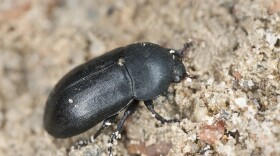-
Throughout history, people have been captivated by owls. There are 260 species of owls across the planet. They can be found on every continent except Antarctica.
-
I’ve always been fascinated by ruffed grouse. For such a small, skittish-seeming bird, they have a hugely outsized presence in the soundscape of the forest.
-
It’s easy to see how the nighthawks’ idiosyncrasies make them a crowd favorite, but what I love most about them are the cherished memories they resurrect.
-
A lone Sandhill Crane stood at the edge of the marsh feeding, its bill dipping repeatedly through the mud with a series of rapid, steady bursts reminiscent of a sewing machine’s insistent motion.
-
Earthworms use their entire body to breathe. Burrowed deep in the ground — slow moving, slow metabolizing — their long frames tighten and relax and pull the air they need from soil.
-
They looked like bulging stockings decorating a mantle at Christmastime. They were certainly gifts of a sort for our winter-weary senses. These were the unique nests of Bullock's Orioles.
-
In the natural world, how to persist—how, even, to improve—in the face of limits and uncertainty can be a punishing question.
-
As I drove home from Missoula, I was alarmed to see wildfire smoke across the freeway from my house in Frenchtown. Even more concerning was the convoy of pickups pulling stock trailers.
-
We have three species of garter snakes in Montana. The snake couple I saw were the terrestrial species, Thamnophis elegans, who can lack the colorful markings of the other two.
-
In late 2020 I’m spending mornings masked, working in a lab in the University of Montana Zoological Museum. The museum houses research collections of natural artifacts like skins and skeletons. But behind the scenes museum staff tend a single living collection: a colony of dermestid beetles, the meticulous scavengers that scour flesh from bones before a skeleton can be installed in the museum.
Play Live Radio
Next Up:
0:00
0:00
Available On Air Stations










